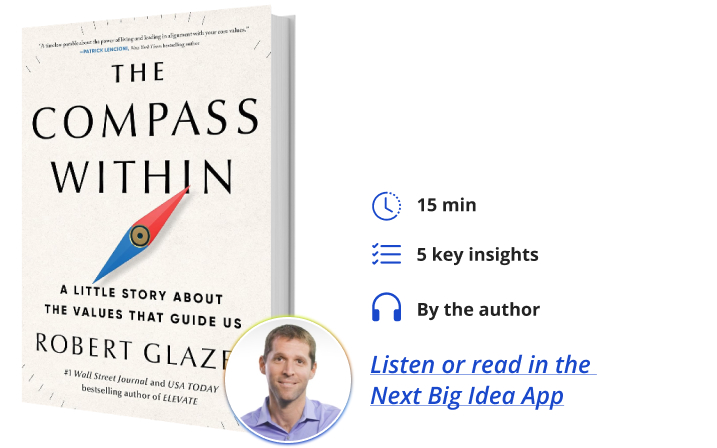Below, Robert Glazer shares five key insights from his new book, The Compass Within: A Little Story About the Values That Guide Us.
Robert is an entrepreneur, former CEO, author of eight books, and keynote speaker. He is the founder and Chairman of the Board of the global partner marketing agency, Acceleration Partners. His writing reaches millions of people around the globe, and his podcast, Elevate, is a top one percent podcast worldwide with over a million downloads.
What’s the big idea?
The Compass Within is a deep dive into the life-changing power of personal core values. Once identified, these principles can act as a decision-making rubric that allows you to act with more confidence and less regret. Life out of alignment with core values feels painfully dissonant. Calm and fulfillment naturally follow when your values guide relationships, work, and habits.

1. One-word values don’t cut it.
When identifying their values, most people confidently list one-word answers. Two of the most common responses are “family” and “integrity.” But when I ask people follow-up questions regarding how those values show up in their lives and guide their actions, these values fall apart.
One-word values are ineffective. They’re too vague, too open to interpretation, and don’t consistently dictate behavior. Let me explain why with those two common examples.
Family is deeply a top priority for many of us. But as a value, it only applies in one area of life. Family doesn’t help you decide how to manage a toxic client or resolve a workplace conflict. What is the principle that dictates how you show up for your family? That principle is a value that is likely consistent in both your work and other relationships. It is broadly applicable outside of family life.
For one person, that deeper principle might be Always Show Up. That person is a consistent and available presence for their family, and that same commitment will carry over to their work and friendships. For a second person, it might be Build Trusting Relationships, and their focus is on building and earning trust with everyone in their lives.
“Actionable core values are universal, clearly defined, and behavior-driven.”
Integrity is another popular choice, but people define integrity in many ways. To some people, integrity means always telling the truth. To others, it means doing the right thing. Still others think it means being consistent with your words and actions. None of these is right or wrong, but in being different, they lead to different outcomes and decisions.
A better approach is for each person to use their specific definition of integrity as their value, with a phrase like Keep Your Word or Do the Right Thing. These are specific, actionable, and unmistakable.
Actionable core values are universal, clearly defined, and behavior-driven. They’re not marketing slogans or aspirations; they’re the principles that guide how you live and lead, especially when the stakes are high.
2. The definition of a core value.
A core value is a short statement expressing a non-negotiable principle that guides your behavior and decisions:
- They are intrinsic, not aspirational. They reflect who you actually are, not who you wish you were.
- They are consistent, showing up across all areas of life: work, relationships, and personal decisions.
- They are clarifying, helping you make better choices about who to spend time with, what work to do, and where to live.
They are like the instruction manual you weren’t given at birth, explaining why you do what you do, and why you are energized in certain settings and drained in others.
A core value is a distinct definition or point of view. It is something that should describe your unique belief, priority, or perspective on life. Generally, it should be pretty rare to find another person with the exact same list of values as you.
Ideally, they are two to five-word phrases, rather than a single word, and those should be worded in a way that serves as a decision-making rubric. You should be able to review your core values list when making a difficult decision and have an indication of what you should do.
A great way to tell if a core value is effective for you is to run them past this four-question filter, which I call the Core Validator:
- Could you use it to make a decision, past or present?
- When you imagine the opposite, does it strike a nerve?
- Is it a phrase, rather than just one word?
- Could you objectively rate yourself on it?
3. Core values are essential to the Big Three Decisions in life.
Actionable core values are most useful as a decision-making rubric. If you are facing a major choice, I’d recommend looking at your list of core values and consider what they are telling you to do. You’ll make decisions with more confidence in the moment and fewer regrets later.
Values are most vital in what I call the Big Three Decisions: your life partner, career path, and the community where you choose to live. When these areas align with your values, life feels purposeful. When they don’t, the disconnect turns into painful dissonance: whether that’s tension in a relationship, disengagement at work, or feeling out of place in your community.
Let’s start with your partner. People often think compatibility means having the same hobbies or personalities. In reality, differences can be healthy and balancing. But misalignment on the big things and core life goals—like finances, family, or lifestyle—can create an ongoing point of friction or source of conflict that’s hard to overcome.
“What matters is working in an organization where the mission and values resonate with you.”
Next is your career. Fulfillment doesn’t require “following your passion.” What matters is working in an organization where the mission and values resonate with you. If your value is “innovation,” you’ll struggle in a place that prizes tradition over creativity. If your value is “trust,” you’ll feel drained in a cutthroat environment that prioritizes results. Work doesn’t need to reflect all your values, but it should never force you to betray them.
Finally, your community. Environment shapes who you are. If your values lean toward quiet, connection, and reflection, but you live in a city that rewards hustle and nightlife, you’ll feel constant friction. You won’t be able to change your community, but your community might change you. The best communities make it easier to live your values, not harder.
If your Big Three are misaligned, the result is a painful dissonance. But when there is alignment with your values, the result is a deeper sense of calm and fulfillment. The key is to know your values and then make these decisions through that lens.
4. Core values are the backbone of authentic leadership.
Core values are the foundation of effective leadership because these deeply held principles quietly drive your most important actions and decisions. Leaders naturally operate from their values, whether they recognize them or not. You can either lead with awareness of what they are or be pulled in certain directions by them, without knowing why. The latter can be problematic both for you and the people you lead.
For instance, someone with a dominant value related to trust may instinctively sort colleagues into “trustworthy” and “untrustworthy” without realizing it and treat them accordingly. If an employee so much as misses an email or shows up five minutes late for a meeting, they are put in the penalty box and may have no idea why.
But if the leader openly shares where their team, “One of my core values is Build Trusting Relationships. Trust is very important to me; here’s how you build it with me, and here’s how you can lose it,” and encourages employees to come talk to them if they feel distance which may be a result of a break in trust. This can foster healthier relationships and accountability.
“Leaders naturally operate from their values, whether they recognize them or not.”
By understanding their own core values and being transparent about them with their direct reports, leaders create authenticity and alignment within their teams. I speak from experience here. My dominant core value is “Find A Better Way and Share It,” and this value shapes my entire approach to work. If someone on my team refuses to try something new or insists on defaulting to what’s worked before, without trying to make things better, that’s going to be a major friction point with me. I make this clear to people upfront so that they know exactly what to expect before joining my team.
Being aware of your values and leading from them brings a feeling of authenticity to your leadership and strengthens trust, clarity, and effectiveness in organizations.
5. You can start clarifying your core values in an hour.
Getting total clarity on your core values doesn’t happen overnight, but you can make a lot of progress in just an hour. The key is to spend time thinking deeply about what’s most important to you. What type of work environments energize you? When are you happiest in your personal life? What activities or environments make you feel alive? What qualities do people come to you for? What are the qualities in other people that you struggle with?
I recommend spending 20-30 minutes reflecting on these topics and writing down your responses. Then, review your written responses and look for themes or concepts that recur.
When I reflect on when I’m most energized and excited in life, it’s typically situations where I am asked to help someone or something get better. I love being in work environments where I’m charged with improving a core process or developing a new idea. Outside of work, I love helping people set and achieve goals, find ways to improve, or reach their full potential. When I write down the things I value most, I find that words like “better” and “improve” keep showing up again and again. Over time, I took this core theme of “doing things better” and turned it into an actionable phrase: Find A Better Way and Share It. This is a clear, specific phrase that guides my daily actions.
Enjoy our full library of Book Bites—read by the authors!—in the Next Big Idea App:
































